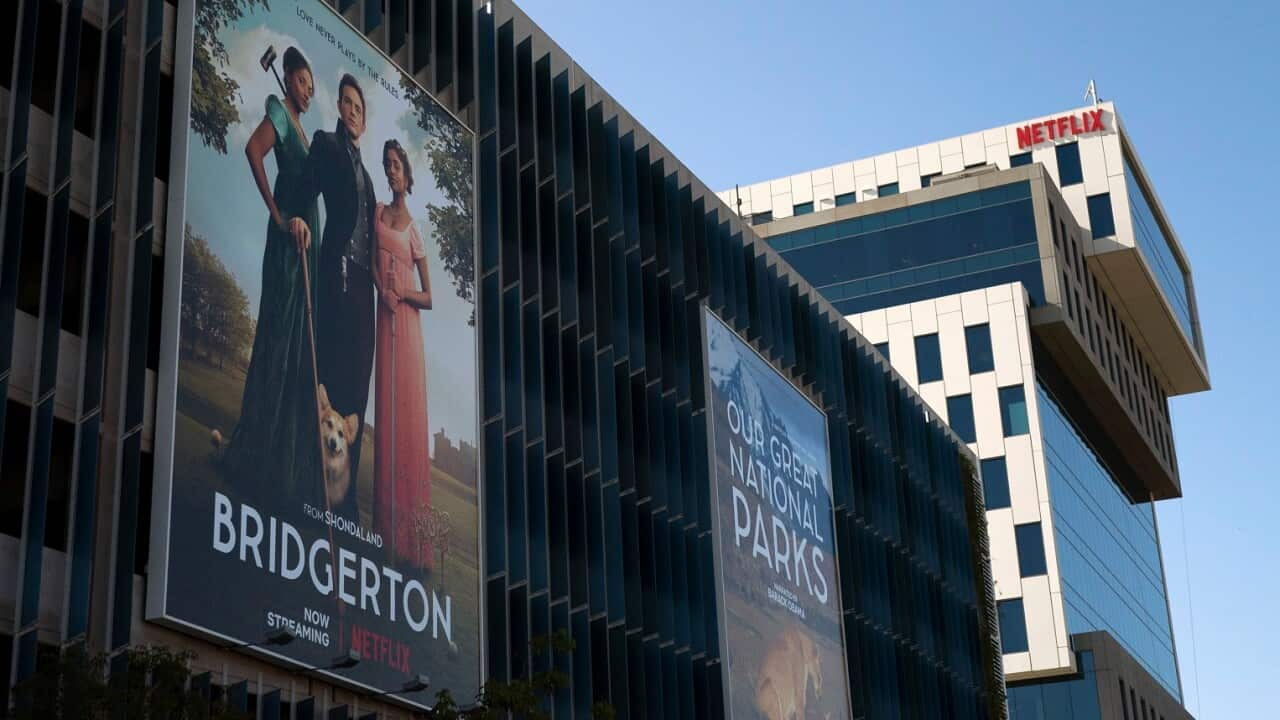Italian
"Image, money, power. Everyone is hustling."
La frenesia di Netflix si è bruscamente interrotta, dopo dieci anni di crescita senza fine.
Il gigante dello streaming ha perso 200mila iscritti nel primo quarto dell’anno – citando l’inflazione, l’esclusione della Russia e la forte concorrenza come ragioni chiave per le sue perdite.
In questi giorni i consumatori hanno una grande varietà di scelta.
Lupin in French: “Incredible treasures, endless resources”
L’analista azionaria di Hargreaves Lansdown Sophie Lund-Yates ha detto a SBS che, mentre le piattaforme di streaming più grandi come Netflix e Amazon Prime sono in una posizione migliore rispetto ad alcune delle piattaforme più recenti quando si vedono i numeri degli abbonamenti diminuire, gli iscritti potrebbero anche non tornare indietro velocemente.
"I think that’s going to be a challenge to convince them to come back and that’s not going to happen until the economic outlook is brighter and household budgets are more flexible."
Altre piattaforme streaming, tra cui Disney Plus, Apple T-V Plus, Stan, Binge e Amazon Prime, sono in lizza per accaparrarsi una fetta della torta.
"Dearest reader, it has been said that competition is an opportunity for us to rise before our greatest of challenges".
E proprio come il Diamante della Stagione di Bridgerton, Netflix deve distinguersi dalla massa.
Lund-Yates ha dichiarato che non è abbastanza avere una grande quantità di contenuto – anche la qualità dei programmi e dei film disponibili al pubblico è fondamentale.
"Today’s subscribers are incredibly well-treated. They're quite picky. That means they need to be offering the latest must-watch. We're stepping away from junk watch culture and people want to be engaged and entertained and unfortunately that comes with huge content bills, those who can spend the most and produce the most quickly - high caliber content."
Nonostante debba vedersela con investitori scontenti, Netflix spera di replicare la formula dei suoi film e programmi originali di successo, con un occhio particolare verso il mercato asiatico.
Il co-presidente di Netflix Theodore Sarandos rivela che uno degli obiettivi dell’azienda per continuare a fare crescere l’attività è continuare a creare ottimi contenuti originali.
“I think about things like our content in Korea - pretty new to the market. Everybody knows about Squid Game. It was probably just about the biggest show in the history of television. Just a few years ago, we were producing no original content in Korea. And while we all know about Squid Game, there's D.P, and All Of Us Are Dead and a slew of original contents are thrilling our members in South Korea and fans around the world. So we're continuing to improve constantly in getting those moments that can lead to something like a Squid Game or a Bridgerton."
Gli iscritti hanno lasciato il servizio in tutte le regioni tranne una, quella dell’Asia-Pacifico, dove gli abbonati a pagamento sono cresciuti di oltre un milione.
UPSOT from Squid Game in Korean:
"The game is Red Light, Green Light..."
"The game we played as kids?"
Netflix quest’anno accrescerà i suoi introiti nella regione dell’Asia-Pacifico del 24 per cento, secondo una nuova ricerca della società di consulenza di base a Singapore Media Partners Asia.
In Australia, Netflix raggruppa un terzo di tutti gli abbonamenti di streaming video on demand e oltre un terzo di tutti i consumi di servizi streaming.
La grande collezione di contenuti originali americani e di serie di commedie e fiction acquistate dal Regno Unito continua a tenere gli occhi australiani sintonizzati su Netflix.
Ma i servizi di streaming non sono la sola forma di intrattenimento che sta battagliando per il tempo dei consumatori.
L’ultima ricerca Digital Media Trends da Deloitte, pubblicata alla fine di marzo, ha trovato che la maggior parte dei consumatori della Generazione Z e dei Millenial trascorrono più tempo guardando video creati dagli utenti come quelli su TikTok e YouTube, piuttosto che guardando film o programmi sui servizi di streaming.
English
"Image, money, power. Everyone is hustling."
The Netflix hustle has hit a wall, following a decade of consistent growth.
The streaming giant lost 200,000 subscribers in the first quarter of this year - citing inflation, pulling out of Russia, and fierce competition as the key reasons for its losses.
These days consumers are spoilt for choice.
Lupin in French: “Incredible treasures, endless resources”
Hargreaves Lansdown Lead equity analyst Sophie Lund-Yates told SBS while larger streaming platforms like Netflix and Amazon Prime are in a stronger position than some of the newer platforms when it comes to seeing subscription numbers fall, subscribers may not come back quickly.
"I think that’s going to be a challenge to convince them to come back and that’s not going to happen until the economic outlook is brighter and household budgets are more flexible."
Other streaming platforms, including Disney Plus, Apple T-V Plus, Stan, Binge, and Amazon Prime, are all vying for a piece of the action.
"Dearest reader, it has been said that competition is an opportunity for us to rise before our greatest of challenges".
Just like Bridgerton’s Diamond of the Season, Netflix must stand out from the crowd.
Ms Lund-Yates says it's not enough to have a large quantity of content - the quality of shows and movies available to audiences also matters.
"Today’s subscribers are incredibly well-treated. They're quite picky. That means they need to be offering the latest must-watch. We're stepping away from junk watch culture and people want to be engaged and entertained and unfortunately that comes with huge content bills, those who can spend the most and produce the most quickly - high caliber content."
Though faced with disappointed investors, Netflix hopes to replicate the formula of its hit original films and shows, with the Asian market being of particular interest.
Netflix co-C-E-O Theodore Sarandos says one of the main focuses for the company to keep growing the business is to continue creating great original content.
"I think about things like our content in Korea - pretty new to the market. Everybody knows about Squid Game. It was probably just about the biggest show in the history of television. Just a few years ago, we were producing no original content in Korea. And while we all know about Squid Game, there's D.P, and All Of Us Are Dead and a slew of original contents are thrilling our members in South Korea and fans around the world. So we're continuing to improve constantly in getting those moments that can lead to something like a Squid Game or a Bridgerton."
Subscribers dropped the service in all regions but one: the Asia-Pacific, where paying subscribers grew by more than one million.
UPSOT from Squid Game in Korean:
"The game is Red Light, Green Light..."
"The game we played as kids?"
Netflix is forecast to grow its revenues in the Asia-Pacific region by 24 per cent this year, according to new research from Singapore-based consultancy Media Partners Asia.
In Australia, Netflix makes up a third of all streaming video on-demand subscriptions, and over a third of all streaming service consumption.
The large library of U-S original and acquired English comedy and drama series keeps Australian eyes watching Netflix.
But streaming services aren't the only form of entertainment fighting for consumers' time.
The latest Digital Media Trends survey from Deloitte, released in late March, found the majority of Gen Z and Millennial consumers spend more time watching user-created videos such as those on TikTok and YouTube than watching films or shows on streaming services.
Report by Monique Pueblos and Richelle Harrison-Plesse




